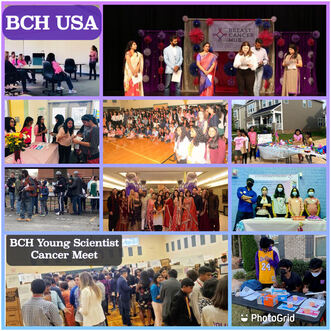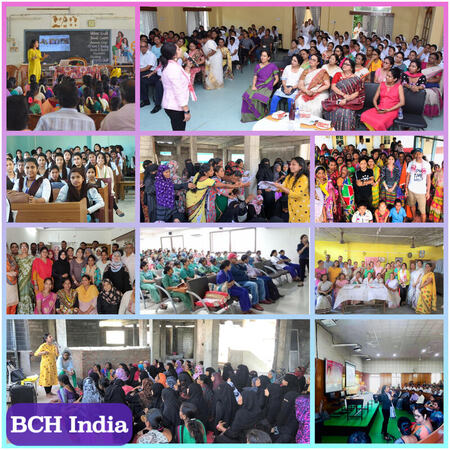|
Words by Vacha Patel
In 2020 the World froze. It will go down in history as the year of a Pandemic. While none of us have been immune to some sort of suffering, whether directly or indirectly from the hardships induced by Covid-19 this year, it’s important to shift our perspective and instead look closely with a more positive outlook: There is an interconnectedness of existence which humanity might not have experienced if it weren’t for the pandemic. Despite starting 2020 with #WW3 memes, humanity experienced quite the opposite. Instead, we saw how people come together when they share the same story, same home, same mission and same adversity. Becoming aware of our similarities, people came together, became stronger and experienced extraordinary change at a breathtaking pace. One of the best examples of harmony and comradery during these trying times was that seen within the scientific community. All over the world, scientists ignored national borders and came together this year with a common purpose and unparalleled momentum to decode the virus and create a vaccine. With the aid of technology, connectivity and mobility we already have millions vaccinated. A more unexpected benefit that occurred as a result of the pandemic was seen in the form of carbon emissions being reduced by the largest amount ever recorded. As people stayed in, the world was able to start healing itself. Continuing this trend, countries like China, Japan and South Korea committed this year to becoming net zero emissions by 2050. Joe Biden promised a $2 trillion climate plan and is set to rejoin the Paris agreement. The EU and UK aim for about 55% and 67% reduction in emissions, respectively, by the year 2030. Also, large corporations like Apple aim to have net zero emissions by 2030 and Walmart by 2040. In addition, the cost of renewable energy sources is declining much faster than predicted. This never before seen alacrity by the global community to address the emergency of climate change is due in large part to the pandemic. Covid-19 has caused some serious disruption in the corporate world. It has caused economies and society at large to bring into sharp focus the immediate economic priorities for governments and businesses. With that being said, environmental, social and governance (ESG) measures are entering a new phase and people approach it with a different lens. Previously, ESG was not a priority as performance-based metrics for companies, but since the pandemic began, corporations have since had to refocus their priorities to include ESG measures. Additionally, ESG ratings are becoming increasingly important for all investors, rather than only attracting the socially conscious investor. This again addresses the issue of climate change, but also focuses on employees’ wellness and social inclusion. It’s important to realize that 2020 wasn’t a boxed event in time. Rather, it was the year that the crisis that already existed became blatantly apparent. As a community of scientists, it is up to us to educate the world and work together towards healing our planet in the next year.
0 Comments
Interview and words by Rinki Saha Edited by Laurie Herviou and Lucie Yammine How widespread is the BCH network? I am very proud to say that when I started in 2017, it used to be a small organization. But right now, we have a BCH Cancer support group with patients from all over the world sharing experiences and providing each other with help and advice to cope with this disease. For instance, we have people from the US, India, UK, Indonesia, Europe, Africa, Bangladesh, Pakistan reaching out for scientific counseling, advice & guidance and I provide it all in addition to connecting them to our other BCH survivors/patients for further emotional support & strength. Since 2018, I have conducted more than ~300 awareness sessions (virtual or in-person)/community outreaches/screening camps mostly in the US & India but now branching out to other countries through our Ambassadors and BCH Chapter Directors conducting outreaches worldwide & spreading across the word. Our upcoming plan includes village adoption in Africa and Indonesia. How could we prevent the early onset of breast cancer?
The breast cancer patient data from India show a 60% survival rate, which does not portray the real data. In reality, many undiagnosed women are dying in rural parts of India. We cannot prevent directly the early onset, what we can do is early detection which could start from 16 years of age. This early detection could be simply done by self-checkups. What are your long-term plans? We plan to expand the awareness and screening program towards other types of cancer and continue providing help at the grass-root level. Apart from that, I want to reach the deepest part of India and adopt more and more villages to help cancer patients. Another dream project for me is to create a worldwide database focusing on the underprivileged sectors to get access to hospitals and resources to provide subsidized cancer drugs and treatment. How can members of INet-NYC help you? We from BCH are always looking for volunteer scientific writers to summarize review articles about the newest scientific discoveries on breast and other types of cancer. These reviews can provide important information about the critical stages of different cancers and provide the latest scientific development to the patients who are motivated to know the complicated pathways and molecules involved in the disease progression. Other than that, if someone wants to volunteer for the outreach program of breast & other cancer awareness, we can provide them with all the small details and help them work on the cause. There will be no time restriction, as it is going to be volunteer work, you can spend as much time as you want but take accountability to help anyone reaching out, navigating them towards us, and staying in the loop. We would like to thank Dr. Lopamudra Das Roy for taking the time to share her awe-inspiring story with INet NYC. Useful Resources for Breast Cancer https://www.breastcancerhub.org/ https://www.breastcancerhub.org/about-breast-cancer https://www.cancer.org/cancer/breast-cancer.html https://www.nationalbreastcancer.org/breast-cancer-facts  Interview and words by Rinki Saha Edited by Laurie Herviou and Lucie Yammine How is BCH spreading awareness in the US & India? Well, to be transparent with you here, in the US, we do not provide financial support. Rather I try to visit shelters to do screening and direct patients towards a care facility where they can get a free mammogram and treatments if needed. In terms of outreach programs in the US, our organization primarily focuses more on dense tissue complications in the detection of breast cancer, but also on the occurrence of breast cancer in men and cancer prevention. I am conducting global virtual seminars and ‘outreaches & awareness’ sessions in various communities in the US. Our Chapter Directors are getting involved in various community outreach. You can read about it here. We also recruit school student volunteers, conduct mentoring workshops, and make them BCH ambassadors. Those student volunteers organize outreach events and speak about the early occurrence of breast cancer and preventative measures in the outreach program within their network or neighborhood. Therefore, the volunteers not only deliver a service to their community but also can acquire leadership skills. I also conduct Young Scientist Cancer Meet and mentor students to help with their career and inculcate the art of scientific thinking & thought leadership. BCH Scientific writers is another program where I mentor the students to write research articles on different topics of breast cancer or other types of cancer, bringing into limelight the scenario not only in the developed but also in the developing countries. We are about to publish 18 articles on breast cancer by BCH scientific writers this year on our website. In 2018 & 2019 in India, I have conducted in person more than 140 outreaches covering cities, towns, villages, tea-gardens, hospitals, colleges, universities, research centers in urban and rural sectors. I am thankful to our collaborators who helped organizing these sessions. During the screening outreaches, I usually share my contacts with anyone with concerns and I guide all suspected cases towards the healthcare system, I provide scientific counseling, education, advocacy & treatment aid when needed, with proper followups. You can read more about it here. Besides, I am mentoring our BCH India ambassadors & we are building lifesaving Early Detection Cards for all types of cancer. We produced Breast Self-Exam Cards for both women & men in 20 different local languages, and the translation was done with the help of our worldwide BCH Ambassadors. Join us in two weeks to learn more about the long-term mission of Dr. Lopamudra Das Roy about this non-profit organization. |
Archives
May 2025
Categories
All
|

 RSS Feed
RSS Feed